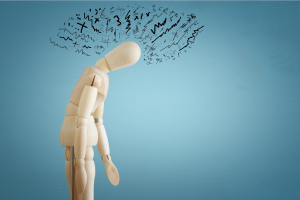Why Treating Postpartum Depression As Trauma is Key to Good Care
 Most health professionals understand postpartum depression (PPD) and other mood disorders are a serious mental health concern. Raising awareness of postpartum mood and anxiety disorders (PMADs) is so important for two reasons.
Most health professionals understand postpartum depression (PPD) and other mood disorders are a serious mental health concern. Raising awareness of postpartum mood and anxiety disorders (PMADs) is so important for two reasons.
First, professionals need to be more proactive with evaluation and diagnosis, because PMADs can be challenging to detect during a brief office visit. Women very often hide their struggle with overwhelming anxiety, worry and depression. Just because a new mom arrives for a checkup, nicely dressed and with her makeup on, it’s not safe to assume everything is okay.
Second, I firmly believe it’s important to approach postpartum mood and anxiety disorders (PMADs) through a trauma-informed lens. With a trauma-informed approach, we can provide the greatest benefit from our care as professionals. Trauma-informed care provides an excellent treatment approach because I believe — without a doubt — women experience PMADs as trauma!
This is one of the main reasons I encourage more professionals and families to become aware of trauma-informed care. Many people experience trauma without realizing what the impact can be, and can benefit most from the special skills of a trauma-informed therapist.
The Number of New Mothers Struggling with Mood Disorders Is Surprisingly High
More women struggle with PMADs than you might think. In a 2013 study, 14% of new mothers screened positive for depression between 4 and 6 weeks after giving birth (which is why more mental health professionals need to address PMADs).
I encourage all doctors, nurses, therapists, and all involved with new parents to address and evaluate for PMADs! Specifically, I’m encouraging health professionals to address this issue in a trauma-informed manner. When we pay attention to the symptoms instead of just the narrative, it’s clear that perinatal mental health issues are indeed traumatic experiences.
It’s important that professionals recognize trauma on behalf of those dealing with it, as explained in my post about trauma-informed care:
Clients may not have considered their life experience to include trauma. A trauma-informed therapist is responsible for noticing and understanding how to help someone heal from adverse experiences, even when that person does not identify as a trauma survivor.
If we describe trauma as unique individual experiences…
- That overwhelm one’s ability to stay grounded in the present, be mindful, and tolerate their feelings
- In which the individual experiences (subjectively) a threat to life, body, or sanity/survival
- Which includes a response of intense fear, helplessness, anger or rage, grief or betrayal
…then PPD/PMADs are trauma!
A new mother experiencing PPD:
- May experience shame for not feeling the “way she is supposed to.” If I’m supposed to be so happy, why can’t I stop crying?
- Has undergone a drastic change in her body and its role. She may be feeling betrayed by her body, which may seem overtaken by new functions of childbirth and breastfeeding.
- May be experiencing extreme fear, anger or helplessness
- Can be feeling grief of her life lost before she had a baby (when she could work, sleep, do what she wanted)
- May feel she should “suck it up” and handle it herself (much like other trauma survivors)
Also like other trauma survivors, the trauma of PPD and/or PMADs impacts the mother and those around her–the baby, the spouse, and the family as a whole.
A trauma-informed approach is a way to help guide healing for women experiencing PPD and/or PMADs. As mental health professionals, I believe it’s our responsibility to deepen our knowledge regarding this methodology.
How to Provide Trauma-Informed Care for PMADs
The first and most important step of any trauma treatment is stabilization, one of three recovery stages which researcher and author Judith Herman describes. Stabilization for PPD/PMADs includes grounding, building safety (including a medication evaluation if needed), resourcing and more. In this article I wrote for the Maryland Addiction Center, I describe the broader stages of trauma treatment; they are the same for those experiencing trauma from addiction or trauma from PMADs. Trauma is trauma!
Another new and helpful resource is Karen Kleiman’s new book, The Art of Holding in Therapy: An Essential Intervention for Postpartum Depression and Anxiety Personally I can not wait to read it (it just arrived in today’s mail). I hope you’ll read it too.
The better we, as professionals, can understand and equip ourselves to recognize the trauma of PPD, the better our treatments can help women recover.
More Resources
For new moms:
- Postpartum Support International
- Postpartum Support Virginia
- Postpartum Stress Center
- A Message To Moms: Your Worth Is Not Measured In Ounces
- It takes honesty, courage and support to seek help for PPD
For physicians and healthcare providers:
- Are You Asking the Right Questions?
- Postpartum depression and anxiety distinct from other mood disorders, brain studies suggest
- Birth Trauma: Strategies for Healing and Prevention
- The Art of Holding in Therapy: An Essential Intervention for Postpartum Depression and Anxiety










Leave a Reply
You must be logged in to post a comment.